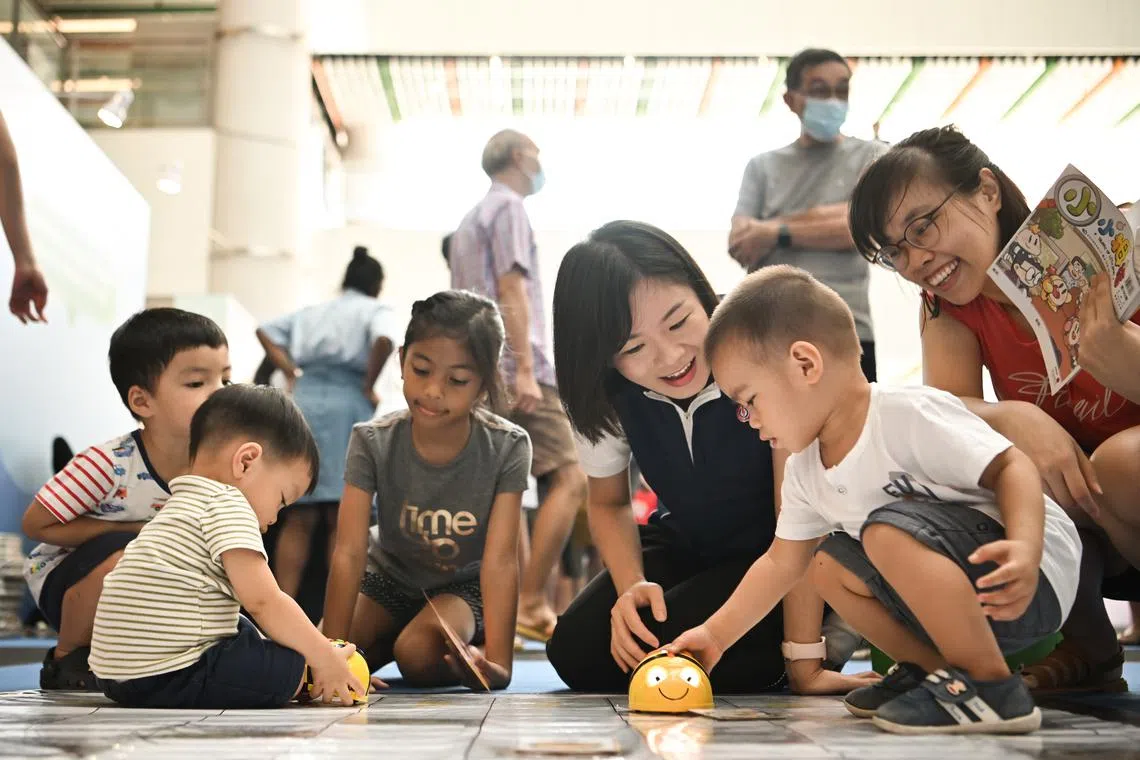20 years as PM
Younger generation of Singaporeans understand importance of the Chinese language: PM Lee
Sign up now: Get ST's newsletters delivered to your inbox

Many young parents are making an effort to speak more Mandarin at home, in the hope their children's command of the language will be stronger than theirs.
ST PHOTO: LIM YAOHUI
Follow topic:
SINGAPORE -Today’s Singaporeans understand the importance of the Chinese language, and want to ensure that the next generation of Singaporeans have a good grasp of their mother tongue, said Prime Minister Lee Hsien Loong.
The fourth-generation leaders likewise remain as determined as past governments to promote Chinese and maintain Singaporeans’ bilingual advantage, added PM Lee, under whose watch the learning of Chinese in school underwent major changes.
In an interview in Mandarin at the Istana on April 28, he gave four reasons why he is sanguine that the standard and status of the Chinese language can be kept up in Singapore, despite abiding concerns that younger Singaporeans are becoming indifferent to their mother tongue and culture.
The first is that schools here are actively pressing on with a bilingual curriculum, and bilingual and bicultural classes are often well subscribed. Students who have interest and aptitude in languages are keen on these lessons, and the numbers have held steady, said the Prime Minister.
Second, community groups such as clan associations are earnestly organising language and cultural activities, and these have likewise garnered a good response.
He noted that at the annual National Chinese Challenge
This was a good sign as it showed that excellence in Chinese instruction was not the sole preserve of just the few Chinese or Special Assistance Plan schools
The third reason is that for many immigrants from China, Hong Kong and Taiwan who have made Singapore home, Mandarin is their native tongue. When they marry Singaporeans and have children, their home environment would tend to be Mandarin-speaking, and their children would become proficient speakers, he said.
“In time to come, many would become the cream (of the Chinese community) – that is natural, and a good outcome,” he said.
Many young parents are also making a concerted effort to speak more Mandarin at home, with the hope that their children’s command of the language will be stronger than theirs.
PM Lee cited a recent encounter with a young father who was speaking in Mandarin with his three-year-old son at a playground.
The father said that while he had “returned all his Chinese language to his teachers” long ago, he was now speaking in Mandarin with his son as much as possible, with the hope of building a strong foundation from an early age.
“He said, ‘I want him to listen to Chinese and use it from a young age, so that next time, his Chinese will be better than mine’,” PM Lee recounted. “So there is hope, and we do not have to be too pessimistic.”
Despite being “rusty”, many Singaporeans realise when they go to China or Taiwan that they have a foundation in the language they can restore, he said. “After a few days or a week, you get used to it, and the words flow more naturally.”
PM Lee’s remarks came as some recent surveys, including from the Institute of Policy Studies (IPS), showed that all ethnic groups have become less proficient in their mother tongue languages, though proficiency in English has risen.
IPS researchers said changes in education policies over the years likely cemented the growing preference for English
PM Lee has played a key role in Singapore’s language education policy.
As deputy prime minister in 1999, he led the Chinese Language Review Committee, which introduced a simplified Chinese-language “B” syllabus for secondary and junior college students struggling with the language. At the higher end, more students were allowed to study Higher Chinese.
As the newly minted prime minister in 2004, his government embarked on another review of Chinese language teaching, which became customised to students’ language abilities, and with greater emphasis on reading and oral fluency.
The Government stood by its bilingual policy but had progressively realised that for most people, the more they learnt of one language, the less they learnt of the second. Basically, a trade-off had to be made, and there had to be realistic targets and expectations for learning Chinese, PM Lee told the House.
In 2011, mother tongue teaching was again updated after a year-long review by the Ministry of Education. PM Lee said then that the objective was to help every student attain as high a proficiency as he or she could. This was as the inexorable trend was English becoming the dominant language in homes.
As Singapore’s society and context keep changing, promoting Mandarin will be a “continuous, never-ending project”, he said at the Speak Mandarin Campaign’s 40th anniversary celebration
For PM Lee, who studied in Chinese schools – Nanyang Primary School and Catholic High School – the project will now be a personal one: He uses solely Mandarin to communicate with his grandchildren.
“I hope they can master both languages when they grow up.”

